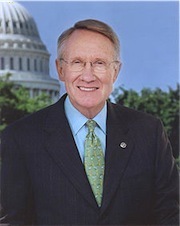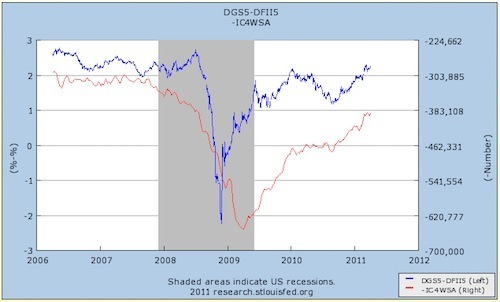Matthew Yglesias's Blog, page 2357
April 12, 2011
Necessary Myths

Ta-Nehisi Coates on the strangely persistent myth of the black confederate:
It's worth considering how this claim lingers. James McPherson is a Pulitizer-Prize winning historian, one of the titans of his field. Bruce Levine wrote a highly readable investigation into the charge. Historians from the Park Service have debunked the myth. There is a website specifically devoted to further debunking the myth. And yet it does not simply linger, it thrives and actually spreads to reputable places like The Takeaway. The information is widely available. We simply can't cope with it.
That black people are participants in the spread of this myth doesn't mean much to me. I'm sure somewhere there are Jews who deny the Holocaust. All this says to me is that it is extremely painful–for blacks and whites–to face up to the fact that Civil War was about the right of white people to pilfer the labor of blacks. We really need to believe that our ancestors were better than this. But they weren't. And, as proven by our inability to accept the truth, neither are we.
This is the kind of thing I tried to keep in mind when I was in China and marveling over the fact that Mao Zedong is on all their currency. To outsiders, the guy seems like a monster responsible for the deaths of tens of millions of people. But he's also the architect of the current Chinese state. We've got Andrew "Trail of Tears" Jackson on our money, Jefferson Davis Highway in Northern Virginia, and apparently the notion that blacks fought on both sides of the Civil War. The desire to make the history of your own country more benign than it really was is powerful.


Congress' School Nurse

(cc photo by kevindooley)
The United States Congress doesn't generally believe in the idea of direct government-provided health care. One important exception is for veterans of the American armed forces. And another—less famously—is for members of congress themselves:
This fall while members of Congress toil in the U.S. Capitol, working to decide how or even whether to reform the country's health care system, one floor below them an elaborate Navy medical clinic — described by those who have seen it as something akin to a modern community hospital — will be standing by, on-call and ready to provide Congress with some of the country's best and most efficient government-run health care.
Formally called the Office of the Attending Physician, the clinic — and at least six satellite offices it supports — bills its mission as one of emergency preparedness and public health. Each day, it stands ready to handle medical emergencies, biological attacks and the occasional fainting tourist visiting Capitol Hill.
Officially, the office acknowledges these types of services, including providing physicals to Capitol police officers and offering flu shots to congressional staffers. But what is rarely discussed outside the halls of Congress is the office's other role — providing a wealth of primary care medical services to senators, representatives and Supreme Court justices.
That seems like a perfectly reasonable idea to me. And Congress seems to be in no hurry to replace it with a system of vouchers used to purchase private insurance that decline in value every time laptops become cheaper.


Dealing Yourself A Weak Hand

Perhaps the strangest thing about the Democrats' negotiating posture as we head into the debt ceiling issue is that this is a mess of their own making. Back during the lame duck, a lot of us thought the debt-increasing tax deal ought to include the debt ceiling issue but Democratic leaders thought this was going to be a winning issue for them come springtime:
Reid also said that he would like to push off raising the debt ceiling until next year — when Republicans control the House, but that he has not discussed the matter yet with his caucus.
"Let the Republicans have some buy-in on the debt. They're going to have a majority in the House," said Reid. "I don't think it should be when we have a heavily Democratic Senate, heavily Democratic House and a Democratic president."
Now Reid's getting what he wants. The debt ceiling will be raised, eventually. And Republicans will have more buy-in on it than they would have had if it happened in December. On the other hand, Republicans now have an opportunity to extract massive policy concessions in exchange for something they favor doing anyway.


Barber Licensing Rules Harm Prisoner Re-entry

Nobody comes out and says "I want to establish an occupational licensing regime for my profession in order to create an arbitrary barrier to entry" but the system works, in practice, to create arbitrary barriers to entry. Consequently, there's a need to find barriers that don't seem totally arbitrary, and one way to do this is to bar ex-offenders from practicing certain trades:
In 1997, Kyrone Pinkston's then-wife accused him of sexually assaulting her. He was charged, pleaded guilty and was sentenced to probation, but after failing to comply with the rules of his supervision, he was sentenced to 10 years in prison. A barber by profession, Pinkston could not renew his license in prison, and it had expired by the time he was released in 2008. When he reapplied, his ex-wife offered her support, writing that he had grown into "a remarkable man and father." A barbershop owner confirmed that Pinkston would have a job when he reclaimed his license. But the agency that licenses barbers, the Texas Department of Licensing and Regulation, rejected Pinkston's application. When he appealed, a state administrative law judge agreed that permitting Pinkston to cut hair presented an unacceptable threat to the public.
I have no particular brief for Kyrone Pinkston notwithstanding the apparent forgiveness he's gotten from his wife. But the point is that holding down a legal job is exactly what we want people to do after they get out of prison. Locking ex-cons out of labor market opportunities has minimal deterrent impact on crime and it's counterproductive from the standpoint of incapacitation. And there's no reason to think the market here will fail. A barbershop owner has no reason to employ a barber who he thinks will do a bad job of cutting hair.


Inflation Expectations And Unemployment Claims
Excellent chartwork from Tom Powers:

Keynesian models of unemployment predict that lower inflation expectations will correlate with new unemployment claims, at least in the short run. Does this hold up empirically? The blue line is the TIPS spread, where lower inflation expectations are lower on the graph. The red line is the negative four-week average of new unemployment claims (seasonally adjusted), where more claims are lower on the graph.
In short, the data appears to be in line with the theory. But I should note that while what we see empirically is a correlation, the theory states that the direction of causation runs from inflation expectations to employment. We're seeing the empirical correlation that the theory tells us to expect.


Paul Ryan's Medicaid Plan Would Lead To Giant Cuts
There's been more talk about Paul Ryan's Medicare plan than his Medicaid plan, but it's probably more important to focus on the latter. That's because Medicare is considerably less politically vulnerable than Medicaid, and also because even if the Ryan Medicare proposal were somehow to be enacted in the 112th Congress I seriously doubt that it would ever actually be implemented in 2023. His Medicaid plan, by contrast, is a proposal to make a change right away and I could imagine serious political momentum developing around some version of it.
What we're looking at here is basically a shell game. Ryan wants to "block grant" the federal money that goes to state governments giving them more "flexibility" and in exchange give them less money. What you're supposed to believe here is that this increased flexibility will allow at least a few states to devise more efficient ways of running Medicaid, and that this model will then spread and it's all flowers and sweets. The reality is that Medicaid is already just about the lowest cost insurance program in the country, and that states already have a great deal of flexibility. The main extra flexibility that a shift to block grants would provide is the flexibility to drop coverage. The Center on Budget and Policy Priorities illustrates this by showing would would have happened over the past ten years had Ryan's plan been enacted ten years ago:

This definitely works as a way of controlling costs. If you take a certain number of low income people and then don't pay for their health care, federal spending on health care falls. That creates more budgetary headroom for tax cuts for high income people. Low income people will make up some of the difference out of their own pockets but, being low income, they'll make up less than 100 percent of it. That, in turn, will reduce demand for health care services slightly reducing the prices that high income people need to pay for the health care services they consume. From the standpoint of an Ayn Rand fanatic who believes that ill-treatment of high income Americans is one of the leading moral problems of our time, this is a very good idea.


Lawrence Summers at INET
I think there's a lot of interesting material in this chat between former NEC Chair Lawrence Summers and the FT's Martin Wolf at the Institute for New Economic Thinking conference. Watched it last night, 'cuz I'm fun. You might want to watch it this afternoon because staring at your computer screen will look like you're working:
A lot of important concessions to left critiques of Obama era policymaking here. I think the best knock Summers gets in against left critiques here is the observation that the original Bretton Woods system didn't just fall apart because neoliberal economists criticized it, it fell apart because it actually stopped working. If you want to replace the current system of international finance you need to say what you'd replace it with.


Harmonic Convergence of Conservatism and The National Education Association
Kevin Carey notes that even as state-level Republicans are waging war on public sector unionism, congressional Republicans are basically giving the country's largest teacher's union what it wants in repudiating the reform trajectory of No Child Left Behind, Race To The Top, and all the rest:
The smaller but influential American Federation of Teachers has often engaged, if erratically, with the standards movement. Some local unions have also been willing supporters of reform. But the NEA is the 800-pound gorilla. NEA President Dennis Van Roekel has accused the Obama administration of "scapegoating" teachers and insists that issues like teacher pay be left at the local level. Van Roekel's predecessor, Reg Weaver, called NCLB a "cruel hoax" and spearheaded a lawsuit designed to gut the law's annual testing and accountability provisions.
Now, whether they realize it or not, Republicans in Congress are trying to grant the NEA's wish by rolling back decades of bi-partisan education reform. As Michael Petrilli, a former Bush administration education official and current vice president of the right-leaning Fordham Institute, puts it, "the local control faction of the Republican party and the anti-accountability wing of the Democratic party are converging."
I think that what you're seeing here is that the preferred arguments of the NEA play very nicely into the hands of hard-core conservatives who'd probably in their dreams just not have public education. This is how Jonathan Mahler characterized the landscape in his tour d'horizon of the education reform debate:
Opponents of reform will tell you the movement was built on a false premise, that the Reagan report was based on declining SAT scores, which weren't really declining; it was just that more people were taking the test. The anti-reformers (for lack of a better term) have their own founding document, too: "Equality of Educational Opportunity," a federal study released a bit awkwardly in 1966, in the midst of President Lyndon B. Johnson's efforts to persuade Congress to devote more resources to schools through programs like Head Start. It concluded that school-based factors like money and teachers actually have little bearing on student achievement, that what happens outside the classroom is actually far more significant than what happens inside of it.
The logic of this position is in fact that the reformers are wrong. The logic of this position is that it doesn't make sense for the federal government to encourage charter schools. This logic of this position is that it certainly doesn't make sense for the federal government to encourage schools to change teacher compensation rules or impose accountability standards on schools. But that's because the logic of this position is that it doesn't make sense for the federal government to spend on money on K-12 education. So it's not surprising that on some level you're seeing this convergence on the federal policy agenda. There are a variety of standpoints from which you can viably criticize the compensation reform agenda without implying that we should drastically cut spending on public schools but the "what happens in schools doesn't matter in general and in particular it's unfair to say that some teachers are more effective than others" carries the clear implication that we should pay teachers less and crush their unions.


Many White Southerners Still Love The Confederacy
Jamelle Bouie we learn that not everyone's done with the Lost Cause:

DC Tea Partier, January 2010 (my photo, available under Creative Commons license)
In the CNN/Opinion Research Corporation Poll released Tuesday, roughly one in four Americans said they sympathize more with the Confederacy than the Union, a figure that rises to nearly four in ten among white Southerners. [...] When broken down by political party, most Democrats said southern states seceded over slavery, independents were split and most Republicans said slavery was not the main reason that Confederate states left the Union.
Bouie deems the partisan gap unsurprising based on the demographics of the GOP, but I do think it's at least a little noteworthy since Republicans (with their more upscale demographics) are usually better-informed about factual questions than Democrats.
I also think the white southerners figure needs to be put in the context of the fact that "the south" as a distinctive cultural region is shrinking. My retired Jewish liberal New Yorker grandparents in south Florida aren't really southern nor are my aunt and uncle in Arlington. Obviously you can't pull off a methodologically rigorous survey of which people are and aren't real southerners, so these measures are the best we can get, but it's in effect an undercount of the volume of pro-confederate sentiments among culturally southern people.


We Need Data On Greenhouse Gas Emissions

I'd seen these reports that Robert Howarth (PDF) from Cornell has calculated that shale gas actually produces 20 percent more greenhouse gas pollution than coal, thanks to the incidental release of methane into the air as a result of mining, but Kate Sheppard's analysis of the study clarifies that there's a lot of uncertainty around this:
Howarth is the first to admit that the numbers they had to rely on to write the paper are "not terribly good." That's because industry isn't currently required to report their emissions—and in fact are one of several industries suing the Environmental Protection Agency to keep it that way. Getting the data proved to be "amazingly frustrating," he says. The numbers he and his coauthors used in the study were drawn from a combination of industry reports, presentations, and dated EPA estimates.
This is part of what makes it so difficult to make sensible environmental policy in a country with a large political movement fanatically dedicated to preserving the right of fossil fuel producers to dump whatever they want into the atmospheric commons. It's not just that it's challenging to pass legislation in the face of resistance, it's that all the subsidiary things that need to happen to do even modest things—to write a blog post saying whether shale oil is more or less polluting than coal, for example—are incredibly hard to pull off.


Matthew Yglesias's Blog
- Matthew Yglesias's profile
- 72 followers



